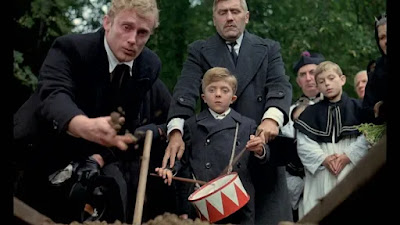Briefly the film is supposed to be a black comedy, a fantastic tale which takes place in Danzig, Germany both before and during WW2. It follows the adventures of a little boy, Oskar, who is so appalled by the cruelty he sees in the rise of Nazi Germany that he willfully decides to physically stop growing at the age of three years old by throwing himself down some stairs. Oskar acts as a narrator throughout giving his pointed observations on what he sees around him. The title refers to a tin drum the boy receives as a toy that he plays whenever he is upset.
In addition to developing an adult’s mind in this child’s body, he also has the ability to use his voice to shatter glass, a talent he uses to his advantage throughout the film.
Oskar forms attachments to various people throughout the film only to have them end horribly in one way or another. At one point he is living with a woman who is sleeping with a man who may or may not be Oskar’s father, a German officer. On the woman’s table is a Palissy charger on which she keeps a Nazi pin which she places on the officer’s uniform.
The use of the Palissy charger is never explained but I think is intended to revolt the viewer and equate the Nazi swastika to the creepy, crawly animals shown on the charger. It may also be a visual reference to a terrible image earlier in the film where a woman takes a hatchet to live eels.
Oskar’s attachment to the woman and her daughter, like all those in the film, ends unpleasantly after which he moves on to another adventure.
The film is filled with relentless cruelty, murder, rape and general ugliness throughout the length of its running time. It also places this boy into extremely inappropriate situations involving adults. I doubt the film would be made today.
It is considered a masterpiece of modern cinema in its critique of Nazi Germany and the cruelty of man. In spite of all that it’s not a film I would recommend to anyone but the most adventurous film enthusiast
To view the trailer in German go here.











No comments:
Post a Comment